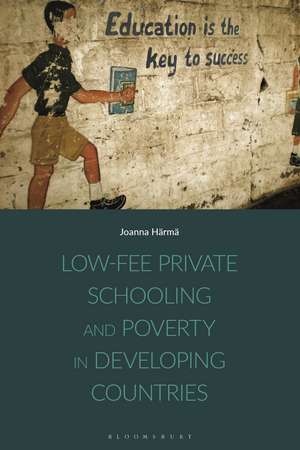Low-fee Private Schooling and Poverty in Developing Countries
Autor Joanna Härmäen Limba Engleză Paperback – 24 aug 2022
| Toate formatele și edițiile | Preț | Express |
|---|---|---|
| Paperback (1) | 198.40 lei 6-8 săpt. | |
| Bloomsbury Publishing – 24 aug 2022 | 198.40 lei 6-8 săpt. | |
| Hardback (1) | 496.27 lei 3-5 săpt. | +29.16 lei 5-11 zile |
| Bloomsbury Publishing – 27 ian 2021 | 496.27 lei 3-5 săpt. | +29.16 lei 5-11 zile |
Preț: 198.40 lei
Preț vechi: 258.21 lei
-23% Nou
Puncte Express: 298
Preț estimativ în valută:
37.97€ • 39.41$ • 31.66£
37.97€ • 39.41$ • 31.66£
Carte tipărită la comandă
Livrare economică 24 martie-07 aprilie
Preluare comenzi: 021 569.72.76
Specificații
ISBN-13: 9781350197527
ISBN-10: 1350197521
Pagini: 264
Dimensiuni: 156 x 234 mm
Greutate: 0.37 kg
Editura: Bloomsbury Publishing
Colecția Bloomsbury Academic
Locul publicării:London, United Kingdom
ISBN-10: 1350197521
Pagini: 264
Dimensiuni: 156 x 234 mm
Greutate: 0.37 kg
Editura: Bloomsbury Publishing
Colecția Bloomsbury Academic
Locul publicării:London, United Kingdom
Caracteristici
Brings together the various forms of private actor involvement in education provision in rich and poor contexts from around the world
Notă biografică
Joanna Härmä is Visiting Research Fellow at the Centre for International Education, University of Sussex, UK; Honorary Fellow at the Centre of African Studies, and Teaching Fellow at Moray House School of Education and Sport, University of Edinburgh, UK.
Cuprins
Introduction: Low-Fee Private Schooling and Poverty1. Creating the Fertile Ground for the 'Mushrooming' of Low-Fee Private Schools in Developing Countries 2. What Low-Fee Private Schools Look Like and Why Parents are Using Them3. How the Poor are Failed by Governments 4. What is to Blame for Poor Learning Outcomes? The Role of Family Background and Environment5. The Poor Are Being Bypassed by a 'Market' that They Cannot Afford to Enter 6. Cutting Their Bellies: The Quality of Low-Fee Private Schools Fails to Justify Parental Sacrifice7. The Role of Profit, Corporations and Chains in the Provision of Education8. Competition, High Stakes and Corruption in the Private Sector9. The Role of Regulation10. Mirroring the Privatization Push in Rich Countries11. Investing in Teachers and Public Systems ConclusionBibliographyIndex
Recenzii
For its scope and detail, Low-Fee Private Schooling and Poverty in Developing Countries will prove indispensable to scholars and policymakers alike. Drawing on two decades of research and work in this field, Joanna Härmä explores the educational challenges facing governments across the developing world and assesses strategies to meet them.
Education has the power to transform lives. Yet millions of the world's poorest children are in education systems that deliver limited learning, failed by education systems that deliver limited learning, trapping them in a cycle of disadvantage and restricted opportunity. Low-fee private schools have often been embraced as the antidote to the failure of government educational - and as a route to opportunity and equity. In this thoughtful, intelligent, informative and highly accessible book, Joanna Härmä demolishes the free market myths underpinning the case for low-fee private schools, while recognising the deep structural failures of public education systems serving the poor. Grounded in her deep personal connections and with communities in India and Nigeria, as well as meticulous research, Joanna Härmä weaves the story that the children left behind would want her to tell - the story of a structural inequalities and unequal power relationships that rob so many children of their potential. Written with a rare mix of humility and indignation her book is a must-read for policy-makers, campaigners, and anyone who cares about the place of education in development.
Education has the power to transform lives. Yet millions of the world's poorest children are in education systems that deliver limited learning, failed by education systems that deliver limited learning, trapping them in a cycle of disadvantage and restricted opportunity. Low-fee private schools have often been embraced as the antidote to the failure of government educational - and as a route to opportunity and equity. In this thoughtful, intelligent, informative and highly accessible book, Joanna Härmä demolishes the free market myths underpinning the case for low-fee private schools, while recognising the deep structural failures of public education systems serving the poor. Grounded in her deep personal connections and with communities in India and Nigeria, as well as meticulous research, Joanna Härmä weaves the story that the children left behind would want her to tell - the story of a structural inequalities and unequal power relationships that rob so many children of their potential. Written with a rare mix of humility and indignation her book is a must-read for policy-makers, campaigners, and anyone who cares about the place of education in development.
